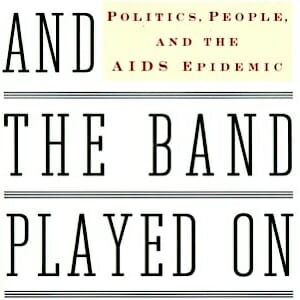And the Band Played On: Politics, People, and the AIDS Epidemic by Randy Shilts

In 1987, a book carrying the title And the Band Played On: Politics, People, and the AIDS Epidemic reached retail stores. Few of the people involved in the book’s acquisition, production and marketing harbored hope that it would sell briskly. Not all that many potential readers even understood the meaning of the AIDS acronym. The full name of the disease did not roll off the tongue, as the cliché goes. Go ahead, say it three times fast: Acquired Immune Deficiency Syndrome. Those who did understand the workings of the newly identified virus knew that the subject matter was depressing, dark and vaguely dirty—pretty much unmentionable in polite society, where reading salons exist.
Randy Shilts, the author, did not worry much about those perceptions. Born in 1951, he had earned respect in the newsroom after obtaining a job there during 1982 in spite of—maybe in some sense because of—being openly homosexual. “Gay rights” was certainly part of the lexicon in 1987, but not well accepted within the civil rights realm. Shilts had published one book previously, The Mayor of Castro Street: The Life and Times of Harvey Milk. Milk was a San Francisco businessman, an openly homosexual man who entered local politics. In 1978, Milk and San Francisco Mayor George Moscone succumbed to bullets fired in City Hall from the gun of Dan White, an anti-gay local politician. Shilts’ biography of Milk showed his skills as a journalist working in depth. But most strong first books are not harbingers of later bestsellers. Shilts’ second book, fortunately, defied the usual trajectory.
An accident of timing helped. On October 2, 1985, American actor Rock Hudson died. AIDS was implicated. Rock Hudson, iconic movie he-man … gay? Could it be?
Oh yes. As Shilts would write, until that celebrity death AIDS “had seemed a comfortably distant threat to most of those who had heard of it before, the misfortune of people who fit into rather distinct classes of outcasts and social pariahs. But suddenly…when a movie star was diagnosed with the disease…the AIDS epidemic became palpable and the threat loomed everywhere.”
Shilts’ book demonstrated that by the time of Hudson’s death, the chance to contain AIDS had passed. The virus had spread across the United States, unstoppable. Shilts estimated that before Hudson’s death, 12,000 other men and women had succumbed to AIDS within the 50 states, with hundreds of thousands more infected and doomed. Around the globe, especially in nations with public health systems far less developed than in the United States, even an estimate was difficult to determine, though the number seemed huge. In fact, the substance of Shilts’ chronological narrative opens on Christmas Eve, 1976, not anywhere in the United States but rather in Kinshasa, Zaire, on the African continent.
Why review And the Band Played On in the middle of 2011? Part of the reason is admittedly artificial, a journalistic tradition that probably ought to be diminished—the tradition of publishing something on an anniversary. The anniversary in play here is the 60th anniversary of Shilts’ birth this week. Born in Davenport, Iowa, he grew up in Aurora, Illinois, with five brothers in a politically conservative, blue-collar family. He chose journalism as his emphasis at the University of Oregon. As far as I can discern, he proclaimed himself publicly as a gay man at age 20. He overcame prejudice in the workplace to do well as a journalist. Shilts died 17 years ago, another AIDS-related demise.
The other part of the reason is not at all artificial: And the Band Played On is painstakingly reported, skillfully structured, compellingly written, and, as it turned out, massively influential. It’s an important book 24 years after publication. It will remain important for many more years because the deadly AIDS—unstylishly and oversimply dubbed “gay cancer”—is not going away.
-

-

-

-

-

-

-

-

-

-

-

-

-

-

-

-

-

-

-

-

-

-

-

-

-

-

-

-

-

-

-

-

-

-

-

-

-

-

-

-








































